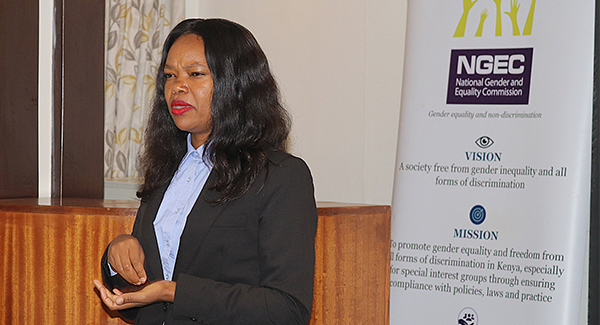Precision, Partnership, Progress: NGEC Validates National Tools for Inclusive Policymaking
Culminating a series of co-creation forums initiated earlier in 2024, the Commission held a validation workshop that signaled a major leap forward in Kenya’s journey toward data-driven, inclusive governance.
The session brought together leading voices from government, civil society, and academia to refine and formally endorse two landmark instruments: the Gender Equality and Social Inclusion (GESI) Data Hub and the National Gender Research Agenda (2025–2027). These tools are poised to transform how the country collects, interprets, and applies data to close persistent inequality gaps.
These instruments are set to transform Kenya’s policy landscape by closing longstanding data gaps and ensuring decision-making is informed by robust, disaggregated, and context-specific evidence.
At the heart of this initiative is the GESI Data Hub—Kenya’s first-ever centralized digital platform for inclusive data. Once operational, the Hub will consolidate sex, age, disability, and region-disaggregated statistics into a user-friendly, accessible system, giving policymakers and stakeholders a powerful new tool to diagnose inequality and develop targeted responses.
“Data is power—but only when it’s inclusive, accessible, and actively used,” remarked NGEC CEO Dr. Purity Ngina during the workshop. “For too long, our national response to inequality has been limited by fragmented or outdated data. The GESI Hub will help us correct that trajectory and move toward truly inclusive governance.”
Equally transformative is the National Gender Research Agenda (2025–2027)—a strategic framework that defines priority research areas to drive responsive policymaking. The Agenda targets critical issues such as teenage pregnancy, harmful gender norms, gender-based violence, and marginalization in arid and semiarid lands.
Its emphasis on community-rooted, action-oriented research ensures that the findings do not gather dust, but instead inform programs and legislation across all levels of government.
The validation workshop allowed stakeholders to scrutinize and fine-tune both frameworks, aligning them with the realities on the ground and Kenya’s constitutional aspirations for equality and inclusion. NGEC is now preparing a communique for submission to the State Department for Gender and Affirmative Action, urging the adoption and national rollout of both tools.What emerges from this process is more than a data upgrade—it is a paradigm shift. These tools promise to replace assumptions with facts, visibility with invisibility, and tokenism with transformation.
As Dr. Ngina succinctly put it, “With the GESI Hub and Research Agenda, we’re not just collecting data— we’re correcting history.” In building an equal Kenya, these innovations represent the infrastructure of dignity, designed for every Kenyan, and driven by the truth of lived experiences.
NGEC CEO Dr. Purity Ngina


Comments